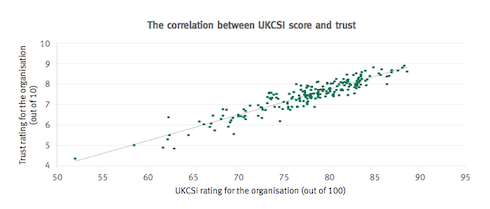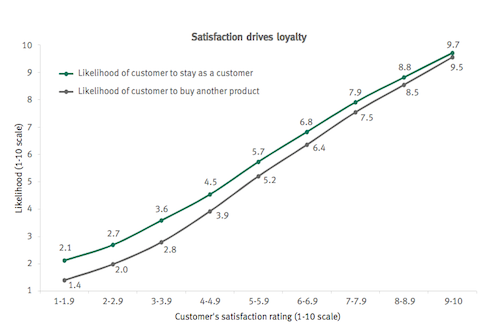Incite Group is now Reuters Events - LEARN MORE
By adaptive - February 5th, 2014
As the relationship between brands and consumers grows closer thanks to social media, how has satisfaction changed?
Having satisfied customers is a core goal of all corporations and the brands they manage. Social media has made customer satisfaction even more important, as consumers become the gatekeepers of brand values, which they communicate on a global scale.
The latest annual UK Customer Satisfaction Index (UKCSI) from the Institute of Customer Service makes for interesting reading specially when placed in the context of brand advocacy and sentiment – all of which is driven by the social media networks. According to the Index, customer satisfaction has fallen. Overall customer satisfaction in the UK is 77.1 (out of 100) in the January 2014 UKCSI, compared to 78.2 in January 2013. Customer satisfaction levels have fallen in 12 of the 13 sectors covered by UKCSI, with only the banking and building societies sector bucking the trend with a small increase of 0.2 points.
Jo Causon, CEO Institute of Customer Service says: “As the economy begins to grow organisations need to recognise that the customer service experience they deliver is increasingly important in customers’ buying decisions. Those organisations that focus on differentiating through customer service are well placed to achieve sustainable performance. But to do this they need to view customer service as integral to building customer relationships across the value chain, not just as a series of transactions.
“These results are a wake-up call to UK business. In an environment where customers are more aware than ever about the standard of service they should receive, organisations cannot afford to lessen their focus on customer service. This is important because it impacts not only the success individual organisations, but also the growth and competitiveness of the UK economy as a whole.”
Trust is also singled out as a major component of satisfaction by the Index, which states: “Throughout 2013, the integrity and trustworthiness of organisations in both the private and public sectors was subject to unprecedented and often intense pressure. Across the economy in 2014, businesses and institutions are fighting to sustain (and, in some cases, win back) customers’ trust.
“The trust benefits of improving customer satisfaction are substantial and quantifiable. By delivering an increase of 10 points (out of 100) in its UKCSI score, an organisation will receive on average an increase of 13 percentage points in the trust rating from its customers. It is clear that delivering high standards of customer service builds trust. The message for all organisations is clear: a focus on creating a service experience that raises satisfaction levels and keeps them high needs to be a core part of any strategy to build and maintain trust with customers.”
Corporations clearly need to do more in the satisfaction stakes. And this factor isn’t without real-world impact. “There are substantial loyalty gains to be made from increased customer satisfaction,” the Index continued. “Customers with higher satisfaction scores are more likely to remain customers and to buy another product or service from the organisation in question. Most customers (56%) who gave an organisation an overall satisfaction rating of 9 points or more (out of 10) stated that they had subsequently recommended the organisation. By contrast, just 29% of customers who gave an organisation a rating of 7-7.9 had given a recommendation.”
Accountable on social
Corporations may shout about their use of social media networks, but this use it seems isn’t being used as widespread as it should to gain consumer advocacy according to new research from Verint.
The study highlights a link between customers receiving attention from service providers and feeling valued. It also reveals that there is nearly an equal amount of consumers who provide feedback as compared to those who don’t, representing significant opportunities for businesses to gain additional insight through voice of the customer initiatives.
The data in this survey represents an opportunity for companies to establish longer-term loyalty with a greater number of customers by encouraging them to become more engaged by developing and driving voice of the customer programs across the enterprise.
-
17% are Brand Champions
Customers that will sing a brand’s praises, remain loyal over a long period of time and be most likely to get rewarded in return.
-
26% are Silent Likers
Customers that may be loyal and happy, but are the least likely to talk about their experiences and engage with brands.
-
14% are Fence Sitters
Customers who appear to be ambivalent about the service they receive; they don’t engage with brands nor share their experiences.
-
23% are Churners
Those that will constantly be on the hunt for a better deal and won’t hesitate to leave if they are dissatisfied with services.
“This survey reveals a disconnect between the actual value of consumer feedback, and what consumers believe to be the impact of their shared input,” says Nancy Treaster, senior vice president and general manager, strategic operations, Verint Enterprise Intelligence Solutions. “The data shows that service is a two-way street and it should demonstrate to consumers that businesses are willing to reward those who speak out in order to help improve loyalty, service and performance”
The research reveals there is nothing to be gained from consumers withholding complaints to the companies with whom they do business, and in fact the more feedback they share—both positive and negative—the more rewards there are to be gained.
With the technology that exists today to capture the voice of the customer and the significant investments in customer services that brands are making, the impetus is on businesses to encourage their customers to understand that organizations are willing to reward them for speaking out in order to help inform and improve the customer experience.
Because brand champions are happy with the service they receive and very loyal—85% staying with a company for more than three years—Verint encourages consumers to become brand champions by being vocal about positive and negative experiences and by giving direct feedback to the organizations with which they do business; by doing so consumers are likely to be rewarded.
Next Reads
June 2015, New York
With over 50 expert speakers (including 15 CMOs and CCOs) from the world’s most social brands, and 300+ of your corporate peers in attendance, #CSMNY offers unrivaled learning, networking and benchmarking opportunities. It is truly THE social media event of year.
Brochure Programme



